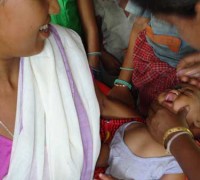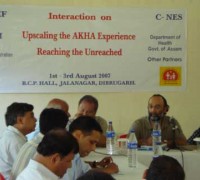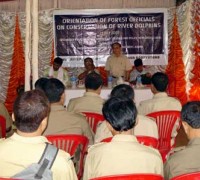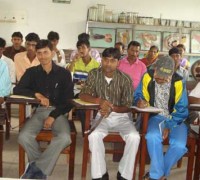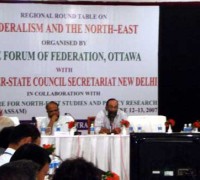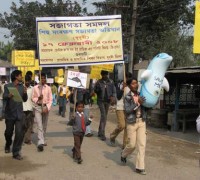By the Brahmaputra (Vol:1) -C-NES Annual Newsletter
April 2007 – March 2008
Editorial: Opening the Innings
This is the first issue of our news letter which seeks to provide communications and information about C-NES, its people, work and activities. We hope it will inform and interest readers whom we request to look at our websitewww.c-nes.org, which is being revamped. We will, naturally, value response. In addition to news about the organization, each news letter will have an editorial on an issue which is relevant to the NER.
I am grateful to Ms. Ankita Das, Communications Officer at our Guwahati office, who has helped put this together and will be responsible for future issues as well.
A highlight of our programmes is the recent collaboration with the National Rural Health Mission (NRHM), Government of Assam, where our specially-designed vessels are reaching tens of thousands of people living on isolated islands on the Brahmaputra in Assam state with health services. We are covering five districts and plan to reach ten in 2008-09.
In this first number, we have flagged our activities of the last year and it is more in the nature of a brief annual report. The next issue of this news letter will be in a quarterly format and will be issued in July 2008.
Editorial: A bandh on bandhs
That the region, its people and especially its leaders need to look beyond itself and themselves is evident. We need to get out of the morass of blame and counter-blame that political parties and armed groups, governments and self appointed guardians of the people in the guise of various forums have developed into a fine art, or rather business.
These groups and individuals waste no time in calling for bandhs at the cost of tens of thousands of crores of rupees and the disruption of millions of lives who depend on daily wages is disturbed and ruined. The latest in this business of bandhs is the son of a former Chi Miniter of Assam. We talk about the Look East Policy, of connecting to South East Asia. But who will want to connect to us if we do not curb these swathe of protests on every issue that we feel we have a right to protest about and disrupt life? This is worth thinking about because investors are particularly sensitive to stability and non-disruption; if they aren’t assured of it, then they just won’t come and will indeed bypass us just as India is trying to bypass Bangladesh with oil and gas extraction from Myanmar and also losing out there as well. Do the governments of the North-east have the capacity and will to crackdown on such activities? Are the groups which make a living out of such bandhs and get such
publicity willing to cut back?
I doubt it, the latter because they know of no other way of functioning, its become second nature to them and the media gets an easy story, without questioning them but there is every need for those who believe in transparency and public rights to assert their views and insist that governments do what they are elected to do, and therefore, at the minimum expected to do by those who elected them: govern. Or is that even too much to ask!
Sanjoy Hazarika
Managing Trustee
C-NES
March 2008
Programme Highlights
C-NES activities are reflected through various campaigns and programmes in different sectors including health, livelihoods, dairy, dolphin conservation, education, and research on range of issues including regional trade. Highlights of major projects and activities funded by various agencies and undertaken by the organization in 2007-08 are given below:
1. Akha and Shahnaz health services
C-NES has been providing health services to communities on the river islands of the Brahmaputra in Assam, groups which do not have any access to health facilities and services through SB Akha and SB Shahnaz. Initially it was done since 2005 in collaboration with the District administration, district of Dibrugarh than Dhemaji and Tinsukia as well as Joint Directors, Department of Health Services, UNICEF and other departments. The boats are specially designed floating clinics cum training centres. Equipped with beds, saline bottle stands and other necessary medical gear, the vessels also provide facilities for treatment on board and enable the delivery of basic health services. The teams, lead by District Community Organizers (DCOs), work extensively on health awareness issues like reproductive health, population control, sanitation, nutrition, malaria control and prevention with priority given to delivery of national immunization programme for children as well as pre and post –natal
check ups for women.
Over 20,000 people, mostly children and women have been treated and immunized in 30 health and immunization camps conducted in the sapories (sandbar) of Dibrugarh district of Assam covering almost the entire resident populations of the islands.
Shahnaz made its first official trial run from Nagaghuli ghat, Dibrugarh (near Maijan TE) on 28th December, 2006. Since than, it has been working on immunization and health check up activities in Dhemaji district, with a team of doctors, nurses and health workers. Sengajan sapori, Baligaon, Panbari, Sonarighat, Badalpur chapori, Lamba Kankan Chapori, Lamba Apsara and Siyung Shree saporis have been visited by the health team, who provided health services to a total of about 800 persons including, 526 immunization.
In February 2008, the health programme was significantly upscaled after an MOU was signed with the National Rural Health Mission (NRHM), Government of Assam, to increase the districts covered to five, including Morigaon and Dhubri, and the selection of 60 new staff, including 10 doctors, 30 ANMS and GNMS as well as lab technicians and pharmacists. Work is going on full swing. Ashok Rao, a specialist in hospital management from Jorhat was appointed Programme Manager, Sanjay Sharma, a veteran of C-NES, is Associate Programme Manager and Sanjoy Hazarika is the Project Director. The five DCOs are Amrit Borah for Dibrugarh district, Hiranya Deka, DCO for Tinsukia, Dulu Buragohain for Dhemaji, Abul Kalam Azad for Morigaon and Meheboob Alom Hazarika for Dhubri. The NRHM has asked us to expand our activities and we propose to increase the outreach in 2008-09 to five more districts making a total of 10 in all. The last five districts are being finalized.
The effort is a major thrust to improve health conditions of, eventually, lakhs of people in Assam.
2. Jamia Millia Islamia and C-NES collaboration
JMI and C-NES have signed a MOU to promote and develop studies of North East India. The Centre at Jamia, the first of its kind in any central University, will work like a Think Tank on the North-East. The Jamia Centre will draw upon the expertise that the C- NES already has in the field of research, publications and study on issues of connectivity of the North-East with other regions of South East Asia, migration, demographics, women in conflict situations, participatory planning and governance. The Center at Jamia will focus on ways and means of strengthening academic research and develop policy alternatives on the geographical entity of northeastern India (covering Arunachal Pradesh, Assam, Manipur, Meghalaya, Mizoram, Nagaland, Tripura and Sikkim) as well as the neighbouring state of West Bengal and neighbouring countries of Bhutan, Bangladesh, Myanmar, Tibet and China. In this context, apart from the areas listed above, it will also look into issues of environmental and
sustainable development, river studies, history, culture, gender, social sector development and infrastructural challenges. To begin with the Centre will focus on research, conducting workshops and setting up a library and resource pool; it shall later introduce graduate and undergraduate courses.
3. Potential of trade relations between North east India, Myanmar, Bhutan, China, Bangladesh and South East Asia
C-NES undertook a one-year project (from November 2006- October 2007), ‘Potential of trade relations between North east India, Myanmar, Bhutan, China, Bangladesh and South East Asia’ sanctioned by the Ministry of Commerce and Industries, Department of Commerce, Govt. of India, aimed at improving relations and enabling the North East to look, as one of India’s main trading and manufacturing hubs, to its neighborhood and beyond. Ground surveys were conducted to enable a comprehensive understanding of the trading activities going on in the region, the actual situation of bilateral trade, official as well as unofficial and investment and several concerned individuals belonging to different sectors were contacted in this regard. These included members of Vyapar Sangh (business associates), export-import bodies, small time traders, those indulging in illegal trade, custom officials, police, journalists, members of civil society groups, etc. Surveys were done through
questionnaires and detailed case studies. Project coordinators are Prof. AC Sinha for Arunachal Pradeesh and Sikkim and Prof Udayon Misra for Assam. The researchers are Mr. Sanjib Kakoty for Meghalaya, Mr. Charles Chasie for Nagaland, Dr. Bhagat Oinam for Manipur, Dr. VN Chawna for Mizoram and Dr. Rajesh Dev for Tripura.
4. The Brahmaputra: Creating livelihoods Promoting conservation—saving: eco-tourism and livelihoods– diary, health and income growth
a. C-NES, through a Ford Foundation supported project, “The Brahmaputra: Creating livelihoods Promoting conservation—saving: eco-tourism and livelihoods– diary, health and income growth”, started a major initiative to strengthen and stabilize the dolphin population in the Brahmaputra River by analyzing the threats to the mammals, the project looked at livelihoods based on dairy training creating public awareness and mobilization on these challenges. The three-year project has been working in six districts i.e Kamrup, Dhubri, Tinsukia, Dibrugarh, Dhemaji and Darrang of Assam since 2006, under the supervision of an eminent Review Committee.
The project has several achievements. Extensive training of fishermen in preparation and use of oil from fish viscera to replace the dolphin oil as fish bait has had an immediate impact on dolphin safety, reducing the threat from poachers who kill dolphin mainly because if its fat. The Assam State government is now considering the setting up of Dolphin Protection Area sites (DPAs) with local community/local resident supported participation and to declare the dolphin as the State River Animal. The project has also launched an extensive eco-tourism/education campaign, using various media tools, audio-visual presentations, workshops and training programmes, targeting school and college students involving stakeholders and building a collaboration of local interests: communities, NGOs, researchers and scientists, media as well as policy makers. Orientation on the conservation of river dolphin was also organized for frontline officials of West Kamrup division at Mirza with 23 officials
attending the programme. A major workshop was held in Gwuahati on December 3, 2007, on challenges before dolphin conservation especially in Assam, where the distinguished zoologist from Patna University, Prof. RK Sinha was the keynote speaker.
The documentary, Children of the River, the xihus of Assam, shot at various locations of Assam, is one of the major tools of the C-NES campaign. It was screened for the first time at the World Resource Institute, Washington DC, on September 10, officially released in India on November 15 at the India International Centre, New Delhi, and on December 3, 2007 in Assam. The film was nominated for the Mumbai International Film Festival in February 8, 2008 and was also screened in Hyderabad as well as in various schools in Assam for purposes of dissemination and public awareness, especially among school children.
b. Under the Dairy project, in 2007, a total of 295 dairy farmers were trained on dairy animal management, veterinary first aid and clean milk production and around 8000 cattle were vaccinated on Hemorrhagic Septicemia and Black quarter. About 700 animals were treated for various diseases i.e. Respiratory Tract Infection (RTI), Corneal Opacity, diarrhea, dermatitis (skin infection), enlargement of hoofs, agelaxia (low milk production), debility (weakness), lice, wounds etc.
5. Training at NDDB, Siliguri
A batch of 20 dairy farmers from Darrang, Dibrugarh and Dhemaji districts in 2006 and a total of 47 new dairy farmers, community workers and local youths from Dibrugarh, Darrang, Dhemaji, Kamrup and Dhubri were given training on Dairy Animal Management (DAM) and Clean Milk Productions (CMPs) at NDDB in the year 2007.
6. Self Help Groups (SHGs)/ Entrepreneur Groups
So far, more than 50 SHGs in all six project sites of the dolphin and dairy project in five districts Dhemaji, Dibrugarh, Dhubri, Tinsukhia and Kamrup disctrict, including two entrepreneur groups have been formed with C-NES support. The entrepreneur groups from Kukurmara developed a boat and two cottages for tourists from the grant received by them and the SHGs are engaged in activities such as dairy, poultry, duck raising, piggery, mushroom and bee keeping.
7. Conferences/Workshops
i. A Regional Round Table on Federalism and the North-East was organized by the Forum of Federations, Ottawa, with the Inter-State Council Secretariat, New Delhi in collaboration with the Centre for North East Studies and Policy Research, from June 12 – 13, 2007 at Guwahati, which discussed the Challenges of Managing Ethnic Diversity, militancy and conflict in the Northeastern Region in a Federal setup. Participants included Mr. George Anderson, President, Forum of Federations, Shri Tarun Gogoi, Chief Minister, Assam, Mr Shyamal Dutta, former Governor of Nagaland, Lt. Gen. (retd) VK Nayar, former Governor of Manipur, Shri PK Mahanta, former Chief Minister, and other senior officials from various Central and State Government ministries and departments.
ii. C-NES in collaboration with UNICEF organized a demonstration camp at Aisung Sapori, Dibrugarh district followed by an intensive daylong workshop in Dibrugarh on August 2, 2007. Issues that were discussed in the program included strategies to upscale the C-NES model and expanding its bouquet of services by bringing in better technical support and services (diagnostic) on board. The meeting also focused on the concept of “Hospital Ships” which could be the base for smaller ships. Other social sectors such as education could be covered through such a unique effort. Mr. Cecileo Adorna, then Unicef’s India Representative, Dr. Sayeeda Hamid, Member, Planning Commission, Government of India, Dr M.K.Sethi, Advisor, Planning Commission, Dr J.B.Ekka, Mission Director, National Rural Health Mission (NRHM), Government of Assam, were among those who attended the event. Participants from NRHM in Dhemaji, UNDP, ONGC, IOCL (AOD), the district administration and Health
Department, Government of Assam, as well as Jalan Industries Ltd. were present.
As a result of this programme, the Planning Commission put the C-NES programme in the 11th Five Year Plan, citing it as an example of “inclusive” health care.
8. Media fellowship
Through our CNES-Setu National Media Fellowship, launched in 2005, we have been providing support to metro and North East journalists to research, understand and communicate on issues relating to the NER and other parts of the country. In 2007, Mr. Neeraj Vagholikar was awarded the fellowship for his project, ‘Large Dams and environment in the North-East,’ which was published in several newspapers.
9. Publications in 2007-08
-
Brochures on the dolphins of Kukurmara, called “Abode of Dolphins, Kukurmara”
-
Dolphin car stickers
-
Brochures on the documentary film, “Children of the river, the Xihus of Assam”
-
Handbook for farmers on animal husbandry, “Pasupalan Samparke Kisu Nirdesona” incorporating all types of diseases and preventive measures, farm management, improved breeds, vaccination schedule, issues relating to dairy farming, poultry, piggery farming, goat and duck rearing.
-
(Under preparation) Resource Manual for the North-east
